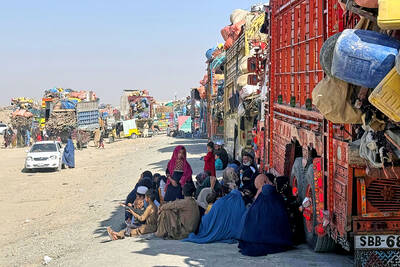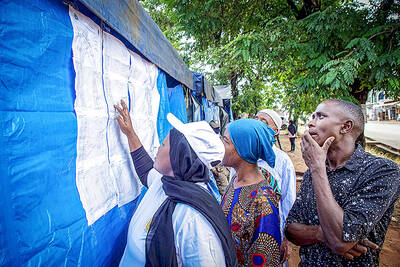France acknowledged on Monday that it had informal contacts with Hamas.
Washington swiftly condemned the move, but French Foreign Minister Bernard Kouchner said such contacts are needed to gauge the humanitaraian and political situation in the Middle East. He said other European countries had quietly done likewise, a contention supported by Hamas.
The opening, however slight, exposed new discord over how to deal with an extremist group that much of the international community has treated as a pariah since it seized control of the Gaza Strip by force last June. Word of the contacts comes after former US.
Former US president Jimmy Carter met with Hamas leaders in Syria last month.
It was even more striking because French President Nicolas Sarkozy has embraced Israel since taking office a year ago, in contrast to predecessors who nurtured France’s traditionally strong relations with the Arab world. But experts noted Sarkozy has signaled the need for “bridges” in response to Carter’s contentious visit.
Speaking on French radio Europe-1, Kouchner insisted the French contacts with Hamas over “several months” did not amount to “relations” or “negotiations.”
He did not delve into the substance of the contacts, but said Hamas has become more “flexible” — even if it still refuses to recognize the Jewish state’s right to exist.
These are “contacts, and nothing else, to inform us about the situation — first on the humanitarian front, and then especially the political one. That’s it,” Kouchner told reporters later at the Foreign Ministry.
“I think ... we’re not the only ones to have contacts of this type — just to inform ourselves — and particularly in the European Union,” he said.
The US government frowned on Kouchner’s comments and reiterated that the administration of US President George W. Bush feels Hamas should be shunned until it changes its behavior.
“We don’t think it is wise or appropriate,” State Department spokesman Sean McCormack said “We don’t believe it is helpful to the process of bringing peace to the region.”
Israeli officials said they would seek clarification from Kouchner when he visited Israel later this week as part of a previously planned trip. Sarkozy is scheduled to visit the region next month.
In Brussels, Belgium, EU officials insisted the 27-member bloc had no official contact with Hamas — other than when EU aid officials come into contact intermittently with local elected leaders or low-level authorities on projects.
Western officials noted the Quartet of Middle East mediators — the US, the EU, the UN and Russia — has demanded Hamas renounce violence, recognize Israel and accept previous peace accords as a condition for any talks.
The French Foreign Ministry sought to play down the remarks by the frank-speaking Kouchner, insisting there was no change in French policy.
Hamas quickly corroborated the French minister’s report of contacts and it claimed communication with other European countries.
Spokesman Sami Abu Zuhri said talks were “about exploring Hamas’ positions on political issues” and were not discussions about opening formal relations.
“It reflects Europe’s awareness that it made a mistake in boycotting Hamas,” he said, without identifying any countries.
A Hamas legislator, Ismail Ridwan, said that there had been “formal contacts, semi-formal, informal,” in Gaza on ways to bring about talks. Hamas has had contact with Norwegians, Italians, Swedes and Russians, he said.
Kouchner addressed the issue of contacts with Hamas in response to an interview published on Monday in the Paris newspaper Le Figaro in which a retired French diplomat — Yves Aubin de la Messuziere — said he had met with Mahmoud Zahar, the Hamas strongman in Gaza, and with Haniyeh.

With much pomp and circumstance, Cairo is today to inaugurate the long-awaited Grand Egyptian Museum (GEM), widely presented as the crowning jewel on authorities’ efforts to overhaul the country’s vital tourism industry. With a panoramic view of the Giza pyramids plateau, the museum houses thousands of artifacts spanning more than 5,000 years of Egyptian antiquity at a whopping cost of more than US$1 billion. More than two decades in the making, the ultra-modern museum anticipates 5 million visitors annually, with never-before-seen relics on display. In the run-up to the grand opening, Egyptian media and official statements have hailed the “historic moment,” describing the

‘CHILD PORNOGRAPHY’: The doll on Shein’s Web site measure about 80cm in height, and it was holding a teddy bear in a photo published by a daily newspaper France’s anti-fraud unit on Saturday said it had reported Asian e-commerce giant Shein (希音) for selling what it described as “sex dolls with a childlike appearance.” The French Directorate General for Competition, Consumer Affairs and Fraud Control (DGCCRF) said in a statement that the “description and categorization” of the items on Shein’s Web site “make it difficult to doubt the child pornography nature of the content.” Shortly after the statement, Shein announced that the dolls in question had been withdrawn from its platform and that it had launched an internal inquiry. On its Web site, Le Parisien daily published a

‘NO WORKABLE SOLUTION’: An official said Pakistan engaged in the spirit of peace, but Kabul continued its ‘unabated support to terrorists opposed to Pakistan’ Pakistan yesterday said that negotiations for a lasting truce with Afghanistan had “failed to bring about a workable solution,” warning that it would take steps to protect its people. Pakistan and Afghanistan have been holding negotiations in Istanbul, Turkey, aimed at securing peace after the South Asian neighbors’ deadliest border clashes in years. The violence, which killed more than 70 people and wounded hundreds, erupted following explosions in Kabul on Oct. 9 that the Taliban authorities blamed on Pakistan. “Regrettably, the Afghan side gave no assurances, kept deviating from the core issue and resorted to blame game, deflection and ruses,” Pakistani Minister of

UNCERTAIN TOLLS: Images on social media showed small protests that escalated, with reports of police shooting live rounds as polling stations were targeted Tanzania yesterday was on lockdown with a communications blackout, a day after elections turned into violent chaos with unconfirmed reports of many dead. Tanzanian President Samia Suluhu Hassan had sought to solidify her position and silence criticism within her party in the virtually uncontested polls, with the main challengers either jailed or disqualified. In the run-up, rights groups condemned a “wave of terror” in the east African nation, which has seen a string of high-profile abductions that ramped up in the final days. A heavy security presence on Wednesday failed to deter hundreds protesting in economic hub Dar es Salaam and elsewhere, some